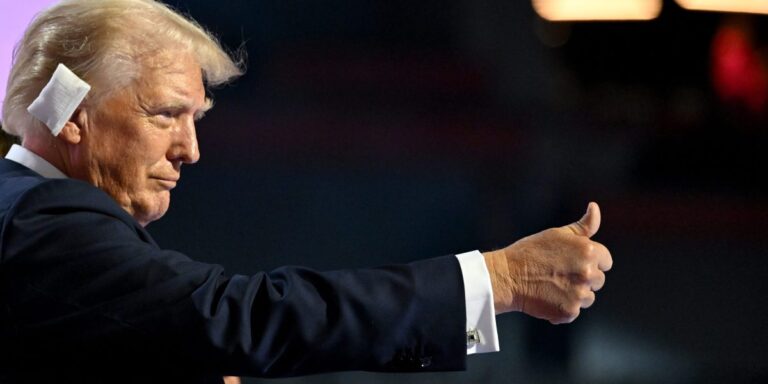
The credit world’s version of the “Trump trade” is starting to take shape: buy high-yield U.S. bonds and avoid anything sensitive to inflation.
Corporate bond investors around the world have already started positioning themselves to profit from a possible election victory for Donald Trump, after an assassination attempt and the Republican National Convention boosted his standing in the polls. Spreads on US high-yield bonds widened against their euro counterparts last week and hedge funds around the world saw a surge in inflows.
“The U.S. high-yield bond market is booming,” said Al Cattermole, portfolio manager at Mirabaud Asset Management. “They are more domestically focused and exposed to U.S. economic activity.”
At the end of June interview In an interview with Bloomberg Businessweek, Mr. Trump said he wants to cut the corporate tax rate to as low as 15%. This spending cut could improve the solvency of weaker companies. American companies could also benefit from protectionist policies that will result in high tariffs on imports if the Republican candidate wins the election.
U.S. high-yield bonds are attractive to money managers because, excluding financials, more than half of the highest-rated high-yield borrowers have only domestic revenues, according to a Bloomberg News analysis. That compares with just a fifth of investment-grade borrowers. The data excludes companies that don’t publicly disclose that information.
Domestic manufacturers could also benefit from lower tariffs and more flexible regulations.
“We’ve added U.S. industrial stocks that could benefit from a pro-business stance from a new administration,” said Catherine Braganza, senior high-yield portfolio manager at Insight Investment. “Companies that benefit from industrial manufacturing, particularly those that deal in auto parts,” are attractive, she added.
Yield curve
Some fund managers are instead focusing on the shape of the yield curve, especially as corporate bond spreads appear to have little room to fall after hitting their lowest level in more than two years.
“We have reduced duration by having shorter-term bonds, by using futures and also by using steepener trades,” said Gabriele Foa, a portfolio manager in the global credit team at Algebris Investments, referring to bets that benefit when the spread between short- and long-term yields widens.
While that gap has widened this year, it remains well below levels seen before major central banks began raising interest rates to combat runaway inflation. Currently, bondholders are getting a paltry 30 basis points of extra yield from holding 7- to 10-year global corporate bonds instead of shorter-term corporate paper, according to Bloomberg indexes, down from 110 basis points just before Trump left office in 2021.
That gives the curve additional room to steepen, especially if the former president’s policies – which are expected to be inflationary and lead to an increase in the national debt – are accompanied by interest rate cuts by the Federal Reserve.
To be sure, not all fund managers are turning to Trump’s portfolios yet. It’s not yet certain that he will win, and even if he does, it’s not clear what he will do once in office.
“It’s a bit early to adjust your portfolio based on assumptions while Donald Trump is in office,” said Joost de Graaf, co-head of the credit team at Van Lanschot Kempen Investment Management. “We still expect spreads to tighten this summer.”
If Trump wins the election, markets, sensitive to rising interest rates, inflation and tariffs, should be more unpredictable.
“A prolonged rally is bad for emerging markets and economic growth will be weaker because of tariffs,” Mirabaud’s Cattermole said. “We expect the European high-yield bond market to underperform over the next nine months.”


